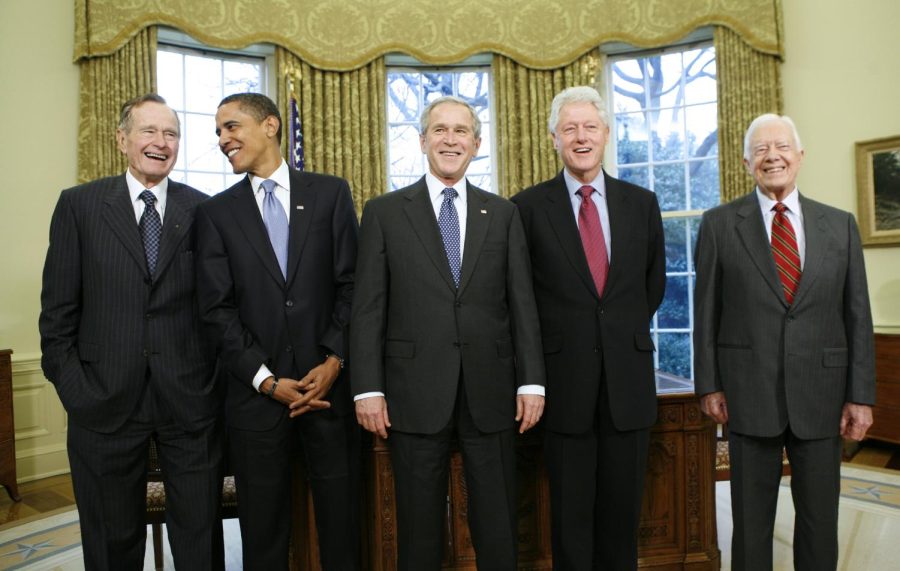Washington Leaders Out of Touch with Technological Advancements
Photo courtesy of U.S. News & World Report
Five of the living former presidents convene in the Oval Office.
The United States’ leaders are growing increasingly old. Joe Biden recently made history as the first U.S. president to turn 80 while in office. Among the five living former presidents, three were born in the same year, 1946. Though this phenomenon is not limited to the U.S. — plenty of other countries have leaders well into their 70s and 80s — it does seem to occur more frequently in the U.S. Senate party leaders Chuck Schumer and Mitch McConnell are both over 70, though Senators Chuck Grassley and Dianne Feinstein beat them both out at 89. To be clear, there is value that comes with age in politics. Older politicians provide the legislature with much-needed perspective, experience, and connections that politicians of younger generations simply cannot hope to bring to the table. However, the fact that the 118th Congress is one of the oldest in the past century presents an issue. Young politicians are essential to a properly functioning and effective legislative process that faithfully represents the nation that Congress serves. New arenas of politics are emerging, like burgeoning technologies that necessitate evolved regulations. Such policies can be difficult to draft without the benefit of having grown up with the technology in question.
Instances of security breaches on foreign social media sites — notably the classified U.S. military documents that were released on a Discord server — place the onus on legislators to turn their attention toward regulating these emerging technologies. We live in a world where technology is constantly growing and redefining itself, to the point where even college students, supposedly on the cutting edge of technological advancements, sometimes have a hard time keeping up with the latest developments. This struggle is also embodied by our older leaders, who have had to absorb the same amount of information about technology within a relatively shorter timespan and then, based on that information, make decisions that define how the country as whole treats social media and technology.
Recently, the U.S. federal government has taken a stand against popular social media and technologies our generation has incorporated into our daily routines. Congress recently called TikTok CEO Shou Chew to testify in front of the House Energy and Commerce Committee, which convened on the basis of a congressional investigation into TikTok’s privacy and data protection practices. Some lawmakers called for a ban of the app, whose parent company, ByteDance, is based in China. Members of Congress also posed questions that reflected a lack of knowledge about the app and technology overall. Representative Buddy Carter of Georgia’s First Congressional District questioned whether or not TikTok tracks pupil dilation as a form of facial recognition for the app’s algorithms. Representative Richard Hudson of North Carolina’s Ninth Congressional District asked whether or not TikTok can access home Wi-Fi if someone’s phone is connected to the network. Both these questions were irrelevant to the overall debate of privacy and, for many people in our generation, self-explanatory.
Though it’s true that familiarity with technology and its uses is not one that only young people can acquire, it is also fair to say that younger generations who grew up using a piece of technology enter the room with a preexisting understanding of how that technology functions. This knowledge gives them a hard-to-quantify but undeniable advantage over older generations in understanding how to regulate that technology. With familiarity come some limitations. Because our generation is so reliant on technology and its benefits, it is possible that we could be disregarding certain harmful influences apps like TikTok have on our lives.
Other arguments have been made about the ways in which an aging legislative body can have negative implications for legislators’ constituents. A Congress with such a homogeneous demographic makeup is not representative of the general population and does not account for the views of an increasingly politically active younger generation. These recent problems, such as concerns over TikTok’s privacy, have highlighted more pressing concerns about elected representatives who lack an understanding of the rapidly shifting world of social media. While this isn’t necessarily a direct result of an elderly legislative body, electing younger legislators would help bridge this gap. As we move into election season, U.S. voters need to consider the benefits of electing younger leaders to positions of power. As college students interacting with these technologies every day, we are aware that those who will regulate these technologies need a better understanding of their practical day-to-day applications.


